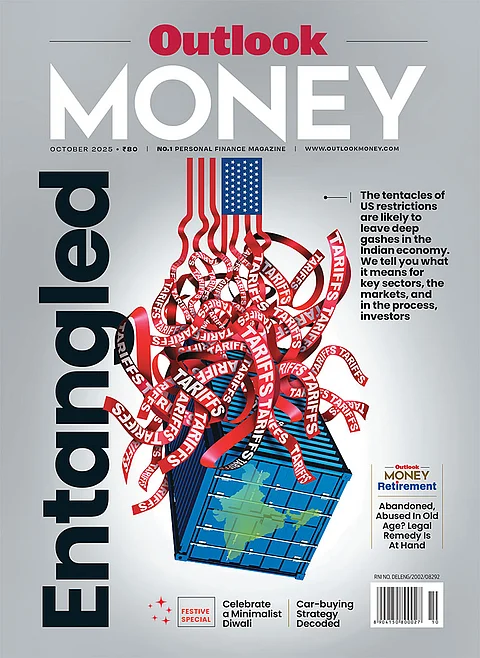The pandemic-induced lockdowns and social distancing norms made the Gen-Z and millennial generations thrifty as late-night parties and friendly hang-outs got curtailed. With more time, more money and mobile phones in their hands, they started exploring the world of investment like never before.
Aditya Prakash, a 22-year-old engineering student from Mumbai, started investing last year as he didn’t have to attend college and had a lot of spare time. Discussions on the stock market and investing are common in Prakash’s family as many of his family members are bankers.
“I used to find the discussions boring earlier, as attending college and meeting friends kept me busy. During the lockdown, I started learning and understanding financial terms while going through digital news articles and business newspapers,” says Prakash, who realized during the process that he could start investing even with a small amount. Now he regularly invests a small amount in systematic investment plans (SIPs) of mutual funds.
The pandemic-related disruptions, digitalisation, extra savings, thanks to fewer outings, and the spare time has led to a paradigm shift in the attitude of Gen-Z, with a lot of them turning into investors from spenders. According to a report by Paytm Money, released in August 2021, How The Young Indian Millennial Invests, 29 per cent of total investors were in the 18-25 years age group, while 31 per cent were in the 26-30 age group.
“Digital channels have also played a key role, but more than that, millennials’ ability to learn about finance has gone up,” says K.S. Rao, head, investor education and distribution development, Aditya Birla Sun Life Mutual Fund.

Preference For Mutual Funds
In financial year 2021, 1.42 crore new demat accounts were opened, the highest ever and almost three times the figure in the previous FY, according to combined data from the Central Depository Services Limited (CDSL) and National Securities Depository Limited (NSDL), India’s top depositories.
Though the number of demat accounts has gone up recently, many young investors prefer mutual funds to direct equities. According to the Paytm Money report, 64 per cent investors in the 18-30 age group invest in mutual funds, followed by 28 per cent in direct equities. The average investment amount in FY21 by millennials was `70,000 across different asset classes, according to the report.
Another report by Boston Consulting Group and the Association of Mutual funds in India, released in August 2019, Unlocking the 100 Trillion Opportunity Report, says that out of the total mutual fund investors onboarded in FY18-19, 47 per cent were millennials (between 20 and 35 years).
Somya, 22, an engineering student from Bengaluru, says she realized the potential of mutual funds at 18 years of age when she withdrew the proceeds from a scheme her father had invested in for her. “My father started an SIP of `2,000 in a mutual fund scheme in my name when I was seven years old. I could not believe my eyes when I saw the maturity amount.” Somya has since then been using her pocket money to invest `1,000 in a mutual fund scheme every month.
In a recently launched new fund offer (NFO) by SBI Mutual Fund, Balanced Advantage Fund, 33 per cent are first-time investors and 20 per cent of them are below the age of 35 years. “The participation of ‘new investors’ is due to increased interest from young investors in MFs and the capital markets and the early investing mindset,” says D.P. Singh, chief business officer, SBI Mutual Fund.
Mutual funds are good for inexperienced investors, who do not have in-depth knowledge or the time for research, as fund managers take care of those aspects.
Devesh Sahi, 24, a trainee cadet with a shipping company, has been investing in SIPs ever since he got his first salary cheque. Sahi, who understood the importance of investing in mutual funds from his colleagues on the ship, prefers funds to direct equity as he doesn’t have enough time to track the markets and individual sectors or companies himself.

Way Forward
The stock markets have been rising in recent months. Between January and September, the Sensex went from 50,000 to 60,000 points, and has been on the rise ever since. Experts believe the market exuberance is leading to increased interest from investors in direct equities. “In the last one-and-a-half years, people have had a good experience in the market. Eventually, when there will be volatility in the market, people will understand and perhaps shift to mutual funds,” says Singh.
The head of marketing in a mid-sized fund house, who did not want to be named, agrees. “The current trend is investing in direct equity, but this trend will get reversed once the market changes its direction. The new entrants will come back to mutual funds,” he says.
There is no doubt that mutual funds have become increasingly popular in India, especially among young investors, as they have the potential to deliver better returns. Equity funds have given market-beating returns, by outperforming their own benchmarks, besides the broadly-tracked Nifty and Sensex by a healthy margin. For instance, in the last three years, ending October 20, 2021, the average compounded annual growth rate (CAGR) from large- and mid-cap funds is 22.76 per cent, while the Sensex has returned 21.53 per cent in the same period.
For young investors, mutual funds could be a good starting point, with competent fund managers doing the job of tracking the markets on their behalf.
Also, the investing process is simple. You may keep investing a lump sum amount in the chosen fund at regular intervals. Alternatively, you may take the SIP route, where you can average out the cost of your investment over a period of time.
letters@outlookindia.com







